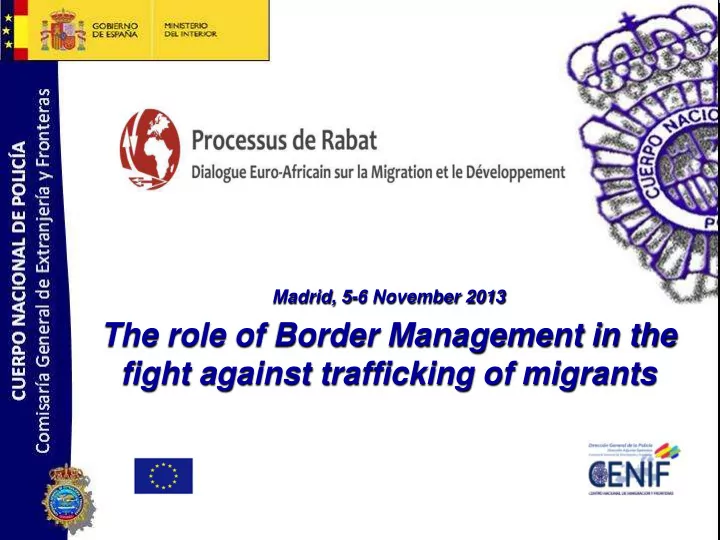

Madrid, 5-6 November 2013 The role of Border Management in the fight against trafficking of migrants
Contents I. Types of irregular migration II. Strategic objectives National Police III. Cooperation with 3rd countries IV. Information Systems at Borders V. Detention Centers and Return
I. Types of irregular immigration Enter illegally crossing external borders False/falsified documents or assisted by facilitators Enter legally and then extend their stay illegally Apply for refugee status and remain illegally
II. Strategic Objectives Cooperation with countries of origin, transit and destination Improve the operational exploitation of Information- Intelligence at national and international level Upgrade infrastructure of Border Control and the technological systems ("smart borders“) Detention Centers and streamline return procedures
IBM - EU Concept- -Four-tier access control model - Measures in 3rd countries - Cooperation with neighbouring countries - Border control - Measures within the territory and return -International Cooperation -Inter-agency Cooperation
III. Cooperation with origin and transit countries Objective: prevent and detect the departures or transit of irregular migrants Measures: -Information-intelligence in situ from different sources -Identify critical areas or points of departure of migrants, methods, routes, criminal organizations -Delivery of specialized training courses mainly at operational level -Operational Cooperation activities on the ground -Financial support for the management of irregular migrants (shelters and effective return to the country of origin) Results: early detection and interception of migration flows at the borders of countries of origin and dissuasive effect to potential immigrants and criminal organizations involved
International Cooperation Frontex Europol Interpol
Information Systems deployed at BCPs IV. Information Systems at Borders
Information systems SIS Alerts issued in respect of 3rd country nationals for the purpose of refusing entry and stay API Transmission of advance passenger data by carriers to the competent national authorities i-FADO Contains the most important information for document checking EURODAC Biometric database for comparing fingerprints identification of non-EU nationals
VIS System for the exchange of data on short-stay VISAS Provided by the standard form of VISA application and the information specified in the VISA sticker
Biometrics Verification and identification of VISA applicants identity visaholder authenticity of the VISA Photography and 10 flat fingerprints Matching at border crossing point and within the territory Access Authorities
Automated Border Control A.B.C Automated gates for machine-assisted border crossings EU citizens holding e-passports
13
Future technologies PNR Passenger Name Record Entry-Exit system -Electronic recording of ENTRY and EXIT information of 3CN admitted for a short stay to the Schengen area Registered Traveller Programme Centralised programme enabling facilitated border checks for third countries nationals
RED CROSS SERVICES - Medical assistance (First aid) - Psychological support - Dry clothes - Food and drinks V. Humanitarian Assistance, Detention Centers and Return procedures
ALIENS DETENTION CENTERS Aim: PREVENTIVE Internment: JUDICIAL DECISION Permanent JUDICIAL CONTROL Detention Centers: 5 (mainland) 3 (Canary Islands) Public Premises Nature (NO PENITENCIARIES)
ALIENS DETENTION CENTERS Maximum Internment: 60 DAYS (Spanish law) NGOs participation Coordination competence (MoI) Medical Assistance Social services (public organization or NGOs )
RETURN Fundamental rights and principle of non-refoulement Removals as a last resort (entry, stay o residence conditions) Monitoring system (Ombudsman) Family integrity and family return to the country of origin Special care with victim of human trafficking and unaccompanied minors Voluntary returns programs
End of presentation THANK YOU FOR YOUR ATTENTION
Recommend
More recommend